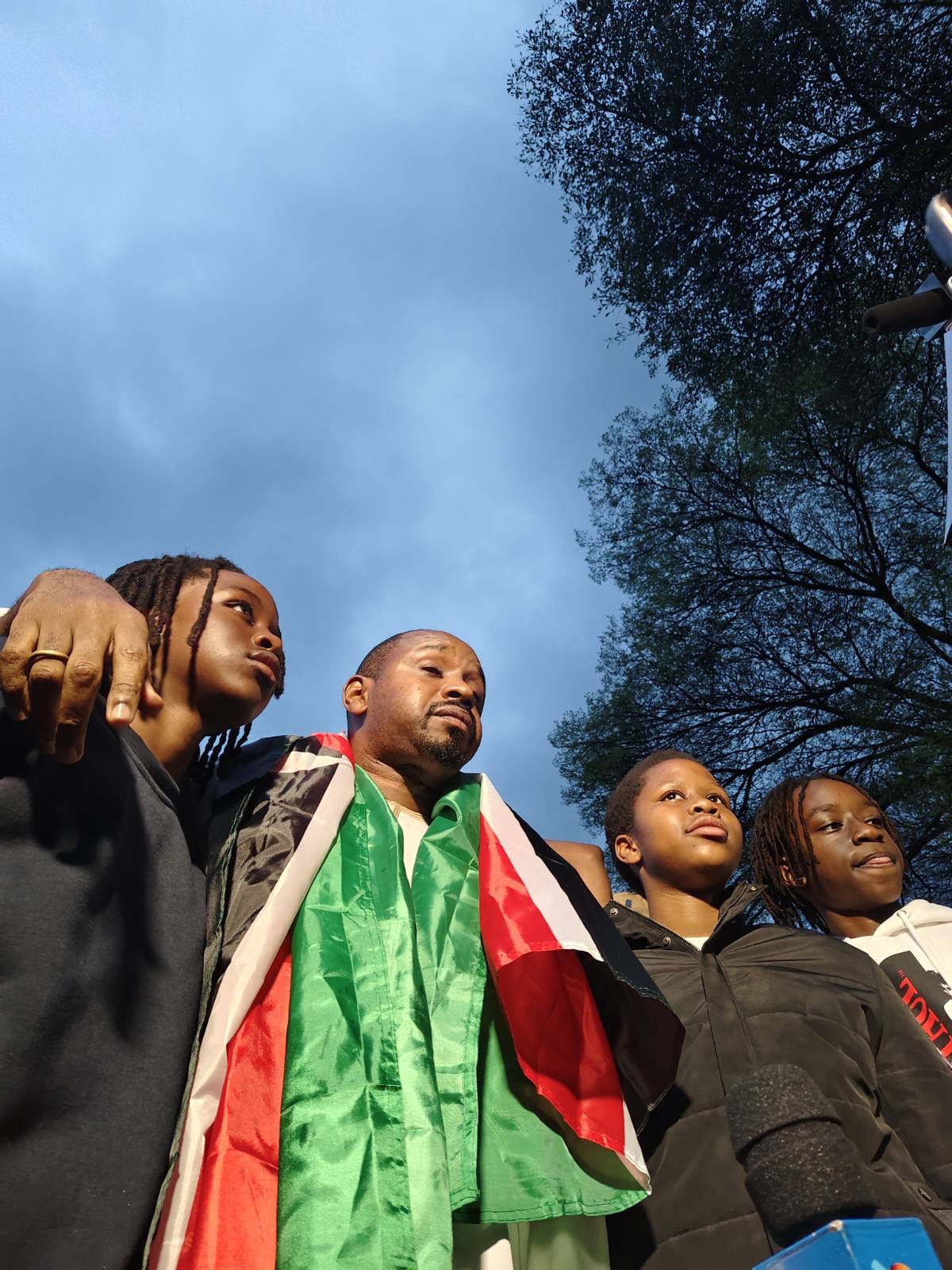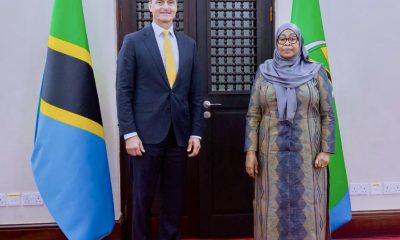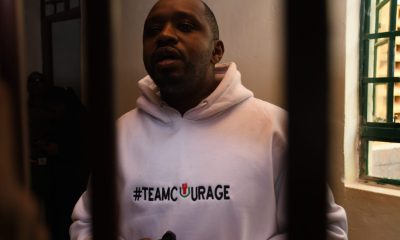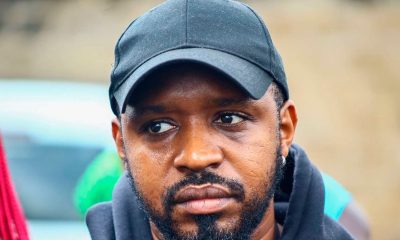News
“We Were Ordered to Strip for ‘Tanzanian Treatment’” – Boniface Mwangi Recounts Torture Ordeal in Tanzania
Boniface Mwangi received by his family at Wilson Airport after being airlifted from Nkunda where he had been dumped by Tanzanian authorities.

Boniface Mwangi details brutal treatment alongside Ugandan counterpart Agather Atuhaire during solidarity mission
Kenyan human rights activist Boniface Mwangi has delivered a shocking account of systematic torture allegedly carried out by Tanzanian security forces during his four-day detention in Dar es Salaam this week.
Speaking publicly after his release on Thursday, Mwangi described being subjected to what he termed “Tanzanian treatment” alongside Ugandan activist Agather Atuhaire, who was found dumped at the Uganda-Tanzania border after their ordeal.
The two activists had traveled to Tanzania on Monday to show solidarity with opposition leader Tundu Lissu, who faces treason charges, and were planning to attend a court hearing for Ugandan opposition figure Kizza Besigye.
Mwangi’s testimony paints a disturbing picture of their detention. “We had been tortured, and we were told to strip naked and to go bathe,” he recounted. “We couldn’t walk and were told to crawl and go wash off the blood.”
The activist described being handcuffed and blindfolded throughout the ordeal, unable to see Atuhaire but hearing “her groaning in pain as they barked orders at us.”
Any attempt at communication between the detainees was reportedly met with physical violence.
“Any attempt to speak to each other during the night we were tortured was met with kicks and insults,” Mwangi stated.
Central to Mwangi’s account is his identification of a specific Tanzanian state security officer whom he holds responsible for orchestrating their treatment.
He described the individual as “overweight, of average height, light brown skin, with wavy short hair and a sagging potbelly,” wearing a black suit and white shirt during the incident.
Most significantly, Mwangi claims this officer “reports directly to President Samia Suluhu Hassan,” directly implicating Tanzania’s highest office in the alleged abuse.
The activist detailed how this security officer followed them from immigration offices to the Central Police Station, where he allegedly ordered their removal to a secret location for what was euphemistically termed “Tanzanian treatment.”
In a particularly troubling aspect of his account, Mwangi described how the security officer allegedly intimidated three lawyers from the Tanganyika Law Society who had come to assist them.
“He scared the three lawyers, and they left us at Central Police Station, where we were removed while handcuffed and blindfolded,” Mwangi said, suggesting systematic efforts to deny the activists legal representation.
Mwangi framed the incident within his broader commitment to pan-African activism, citing previous solidarity visits to imprisoned activists across the continent, including Tanzania’s Freeman Mbowe, Uganda’s Stella Nyanzi, and opposition leader Bobi Wine.
“I’m a Pan-Africanist, and I have trained and mentored activists in all four corners of our continent,” he explained, quoting Ghana’s Kwame Nkrumah: “I’m not African because I was born in Africa, but because Africa was born in me.”
In an unusually direct confrontation with Tanzania’s leadership, Mwangi declared: “Everything that happened to us in Tanzania was done in Samia Suluhu’s name, and we will ensure the world gets to know.”
He vowed that neither he nor other activists would be silenced, stating: “What Suluhu did to us will be revealed to the world. We shall not be silenced by a torturous dictator who has her foot on the necks of the Tanzanian people.”
While Atuhaire has been found and released at the border, concerns remain about her condition and the broader implications for activist networks across East Africa.
The incident has prompted intervention from both Kenyan and Ugandan diplomatic missions.
Martha Karua, a prominent Kenyan politician, has written to the African Union regarding the detention and alleged torture of both activists, signaling potential regional diplomatic consequences.
The incident highlights growing tensions around civil society space in East Africa and raises questions about the treatment of regional activists engaged in cross-border solidarity work. Both activists were reportedly in Tanzania for less than 24 hours before their detention.
Mwangi emphasized that such treatment should not deter continued activism: “Our arrest and detention should not stop the solidarity among African activists or deter us from showing up for each other. Dictators are united, and only our own unity can help democratize our respective countries.”
The Tanzanian government has not yet responded to the specific allegations made by Mwangi, though the incident is likely to strain regional relations and draw international scrutiny to Tanzania’s human rights record.
Kenya Insights allows guest blogging, if you want to be published on Kenya’s most authoritative and accurate blog, have an expose, news TIPS, story angles, human interest stories, drop us an email on [email protected] or via Telegram
-

 Business1 week ago
Business1 week agobetPawa Empire Crumbles: Mr Eazi’s Betting Gambit Unravels Amid Partner’s Shadowy Deals
-

 News6 days ago
News6 days agoDCI Probes Meridian Equator Hospital After Botched Procedure That Killed a Lawyer
-

 Business5 days ago
Business5 days agoMinnesota Fraud, Rice Saga, Medical Equipment Deal: Why BBS Mall Owner Abdiweli Hassan is Becoming The Face of Controversial Somali Businessman in Nairobi
-

 Business1 week ago
Business1 week agoKRA Boss Humphrey Watanga In Big Trouble In Sh5.5 Billion Rice Import Scandal
-

 Investigations2 weeks ago
Investigations2 weeks agoKERRA Homa Bay Region Manager Calvince Thomas Accused of Swindling Businessman Ksh 2 Million in Phantom Tender Deal
-

 Business1 week ago
Business1 week agoState Set to Demolish Pastor Ng’ang’a’s Church in Sh28 Billion Railway City Push
-

 Business7 days ago
Business7 days agoControversial Turkish Firm Celebi Canceled in India Over Security Concerns Acquires Strategic Property in Nairobi’s Main Airport
-

 Politics5 days ago
Politics5 days agoYour Excellency! How Ida’s New Job Title From Ruto’s Envoy Job Is Likely to Impact Luo Politics Post Raila
































